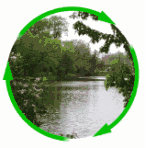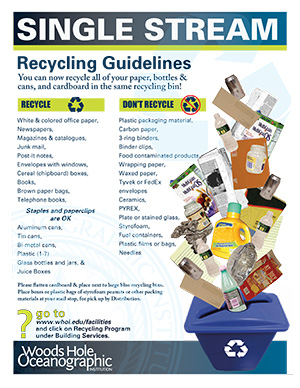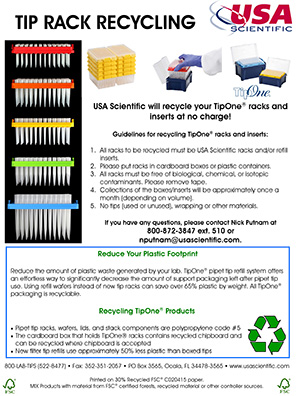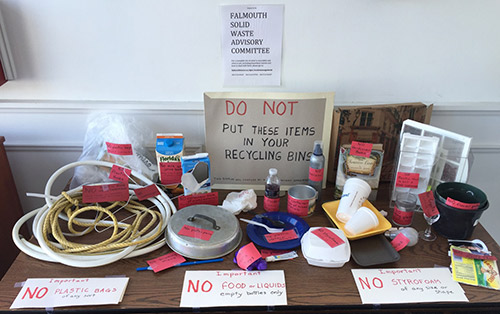Recycling Program
 WHOI Recycling is responsible for managing a cost effective waste management program that emphasizes reduction, reuse and recycling with trash disposal as a last resort. The Facilities department has developed a comprehensive recycling program focused on office paper, cardboard, bottles, cans, and plastics as "Single Stream" recycling.
WHOI Recycling is responsible for managing a cost effective waste management program that emphasizes reduction, reuse and recycling with trash disposal as a last resort. The Facilities department has developed a comprehensive recycling program focused on office paper, cardboard, bottles, cans, and plastics as "Single Stream" recycling.
If you are interested in serving as a department recycling coordinator, or want more information on recycling at WHOI, contact Troy Kelley.
Recycling Tips
- Small blue recycle bins should be placed at each desk throughout the Institution. If you need a desk-side bin please contact Troy Kelley.
- Each building will have an appropriate number of larger recycle bins for use in collection by the cleaning staff, or to handle larger items. Look for blue recycling bins marked "WHOI Recycles".
- There will also be larger bins placed in strategic, centralized locations to handle non-recyclable trash. The smaller desk-size bins will be removed from offices.
- Bottles and cans having a 5 cent redeemable value should be recycled in bins marked as such. These are donated to local charities.
- To recycle packing material such as peanuts, styrofoam, and boxes, contact the Distribution Department at x2416.
- To recycle equipment that is no longer needed, contact the Property Office at x2843.
- To pick up Hazardous Waste, contact the Safety Office at x3347.
- Batteries, Fluorescent Tubes and Cathode Ray Tubes may be recycled at the Universal Waste Collection Areas located throughout the Institution.
Reduce, Reuse, Recycle
Reducing waste is the first step in controlling our environmental impact. When you reduce the amount of materials you individually waste, you decrease the total waste produced by the entire campus. This means that there is less to Reuse, Recycle, send to landfills, or incinerate which creates air pollution. Your impact directly affects what is purchased and discarded by WHOI. Therefore, the less you consume, the less WHOI will purchase. Reducing also means that you keep the environment in mind when doing personal shopping. You can look for goods packaged in recycled or recyclable materials and also consider whether you actually need the item. The longer a product lasts, the less frequently replacements are needed, reducing overall waste.
» Fact: The average American throws away 3.5 pounds of trash a day.
Although recycling is a desirable way to dispose of used and unwanted materials, waste prevention is a superior solution. Waste prevention saves both energy and money. Reusing is a simple way to decrease your environmental impact; it takes no extra time, just conscious action. The more you reuse products and materials, the less waste gets put into landfills where it will sit for thousands of years! While buying less is the easiest way to reduce what we use, reusing allows us to extend the life of items that have already been purchased.
» Fact: The reuse of one ton of paper saves enough energy to heat the average home for six months, saves 7,000 gallons of water, 380 gallons of oil, and 3 cubic yards of landfill space.
In the hierarchy of waste management, recycling is certainly not on top. Having less waste to begin with is clearly the first priority, but how we deal with the waste that we do create is also very important. Recycling saves energy and other natural resources, which are becoming more scarce every day. It takes a great deal of both local and individual efforts to institute recycling effectively and efficiently. It needs to be available, accessible, easy to understand, and (eventually) automatic.
FAQs
Q. Why do I have a "blue" recycle bucket in my office?
A. WHOI provides a recycling bin at every desk side. It is blue so that we can standardize the program from building to building.
Q. What goes in it?
A. Almost all paper items, cans, and plastics can go in the bin. See attached Recycle Guidelines.
Q. Do I have to empty it?
A. The cleaning staff will empty the containers every Wednesday evening.
Q. How do they have time to perform this additional task?
A. On Wednesdays, the cleaners will only empty trash cans in public areas, break/kitchenette areas, conference rooms, and bathrooms. This will provide them the necessary time to empty the recycling containers. This is the same method utilized at organizations with strong recycling programs.
Q. Why is my desk-side trash bin going away?
A. Proper recycling practices will minimize the need for "regular" trash. There will be a trash bin for such items in a central location on each floor.
Q. What should I do if I am not sure whether or not a particular item can be recycled?
A. Please see the Recycle Guidelines or contact Troy Kelley.


